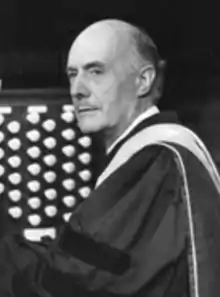Clarence Dickinson
Clarence Dickinson (May 7, 1873 in Lafayette, Indiana – August 2, 1969 in New York City) was an American composer and organist.

Dickinson studied at Miami University and Northwestern University, then traveled to western Europe to study under Moritz Moszkowski, Alexandre Guilmant, and Gabriel Pierne. After returning to the United States, Dickinson was organist at St. James's Episcopal in Chicago and the Brick Church in New York. He joined the faculty of Union Theological Seminary in 1912, where he remained until his retirement in 1945; he founded the institution's School for Sacred Music there in 1928.
He was one of 11 charter members of the Eagle's Nest Art Colony in Oregon, Illinois.[1]
He and his wife, Helen Adell Snyder (1875–1957), co-wrote a large amount of sacred music, as well as a general-audience music appreciation book titled Excursions in Musical History. While he composed large-scale pieces, including at least one organ symphony, he was better known as an arranger and pedagogue; his 1922 publication Technique and Art of Organ Playing was a standard reference work which went through several editions in his lifetime, and he edited a general-use hymnal for the Presbyterian Church in the United States of America in 1933. Late in life he and his wife collaborated on an edition of anthems written by early Moravian settlers in the United States.
William Carey College named the Clarence Dickinson Memorial Library of Church Music in his honor.
The American Guild of Organists named the Clarence Dickinson Society, its legacy and planned giving program, in his honor.
References
- "The Founding of the Association and the Camp". Archived from the original on 2006-09-01. Retrieved 2018-11-07.,"NIU Historical Buildings: Lorado Taft Field Campus Historical Significance", Northern Illinois University. Retrieved November 6, 2018.
- Vernon Gotwals, "Clarence Dickinson". The New Grove Dictionary of Music and Musicians. 2nd edition. Oxford, 2001.